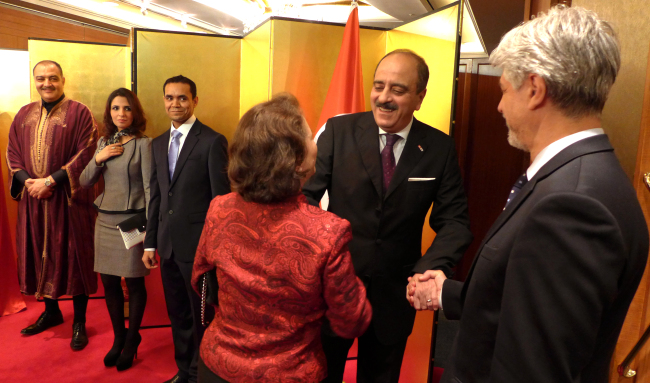The Tunisian Embassy held a reception on March 20 to commemorate the country’s independence from France, while sharing sorrow and consolation for the victims of a terrorist attack in the capital Tunis the previous week.
“Allow me to express my deep sorrow over the cowardly terrorist attack at the Bardo National Museum, and extend sincere condolences to the bereaved families. I wish for their prompt recovery,” Tunisian Ambassador Ali Nafti said in his welcoming speech. “I want to reaffirm Tunisia’s firm commitment to fight terrorism and build a modern democratic country.”
 |
| Tunisian Ambassador Ali Nafti (second from right) shakes hands with visitors at the 59th anniversary of independence reception at Lotte Hotel in Seoul on March 20. (Joel Lee/The Korea Herald.) |
Tunisia gained independence from French colonial rule on March 20, 1956, reestablishing its Islamic, Arabic and African roots. “More than five decades of improvements in education, health care and women empowerment led to the Jasmine Revolution in December 2010, putting an end to oppression and ushering in an era of democracy, justice and dignity,” the ambassador said.
There are still inefficiencies in the state of developments in Tunisia, Nafti noted, but last year saw progress in institutional beginnings of a new constitution, legislature and presidential elections, and irreversible democracy.
“This will be a year of economic transition in Tunisia, with a genuine ‘takeoff’ of our economy in line with five-year development plans,” Nafti stressed. “We will tackle unemployment, regional inequality and national security against terrorism.”
Korea’s Deputy Minister for Overseas Koreans Lee Key-cheol gave a speech, highlighting the last 46 years of diplomatic relations that led to growing collaboration in development projects, joint ventures and scientific exchanges across public and private sectors.
The Islamic State of Iraq and the Levant claimed responsibility for the attack on March 18, which killed 22 civilians and injured over 50, mostly European tourists.
Yassine Brahim, Tunisian Minister for Development, Investment and International Cooperation, told the Wall Street Journal that the attack was driven by extremists who sought to disrupt the country’s democratic reforms.
By Joel Lee (joel@heraldcorp.com)



